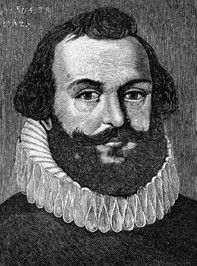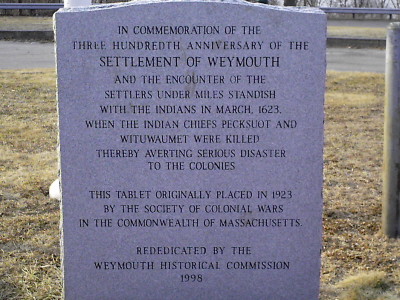 |

 |
 |

 |
The words on the monument speak for themselves
Myles Standish
1584 - 1656

Treachery Commemorated
It must always be remembered, when reading material such as the following, that the Indigenous Peoples of the Americas were not the invaders, they were defending their Birthright! In 2004 I became aware of an anti-Confederation speech made in 1867 by the Honourable Joseph Howe (Commissioner of Indian Affairs, Premier of Nova Scotia, Poet, and Father of Canadian Confederation, etc.). The following is a quote from it, which fully supports my statement:
“...The Indians who fought your forefathers were open enemies, and had good reason for what they did. They were fighting for their country, which they loved, as we have loved it in these latter years. It was a wilderness. There was perhaps not a square mile of cultivation, or a road or a bridge anywhere. But it was their home, and what God in His bounty had given them they defended like brave and true men. They fought the old pioneers of our civilization for a hundred and thirty years, and during all that time they were true to each other and to their country, wilderness though it was. There is no record or tradition of treachery or betrayal of trust among these savages.... The race is mouldering away, but there is no stain of treason on its traditions. Even in its day of decadence and humiliation it challenges respect, and when the last of the Micmacs bows his head in his solitary camp and resigns his soul to his Creator, he may look back with pride upon the past....”
During March 1623, British Captain Myles Standish lured two Chiefs to a meeting then murdered them. The picture of the monument, erected by the Weymouth Historical Commission, depicts how the town of Weymouth, Mass, takes pride in his barbaric deed.
To view European colonial crimes against humanity as acts of heroism is indefensible! In a civilized society the horrific savage deeds committed against American Indians by European colonial officials such as Puritan Captain Myles Standish, Explorer Christopher Columbus, Nova Scotia British Colonial Governor Edward Cornwallis, Massachuetts British Colonial Governor William Shirley, British Bounty Hunter Captain John Gorham, and hundreds more too numerous to be recounted here, and their born in the Americas descendants, should be remembered with shame and sadness, not as if their crimes against humanity were heroic deeds to be admired. Would such be the case if their unfortunate victims had been of Caucasian linage?
Quotes from The Hidden History of Massachuetts
The Pilgrims of Plymouth, The Original Scalpers
Contrary to popular mythology the Pilgrims were no friends to the local Indians. They were engaged in a ruthless war of extermination against their hosts, even as they falsely posed as friends. Just days before the alleged Thanksgiving love-fest, a company of Pilgrims led by Myles Standish actively sought to chop off the head of a local chief. They deliberately caused a rivalry between two friendly Indians, pitting one against the other in an attempt to obtain "better intelligence and make them both more diligent." An 11-foot-high wall was erected around the entire settlement for the purpose of keeping the Indians out.
Any Indian who came within the vicinity of the Pilgrim settlement was subject to robbery, enslavement, or even murder. The Pilgrims further advertised their evil intentions and white racial hostility, when they mounted five cannons on a hill around their settlement, constructed a platform for artillery, and then organized their soldiers into four companies-all in preparation for the military destruction of their friends the Indians.
Pilgrim Myles Standish eventually got his bloody prize. He went to the Indians, pretended to be a trader, then beheaded an Indian man named Wituwamat. He brought the head to Plymouth, where it was displayed on a wooden spike for many years, according to Gary B. Nash, "as a symbol of white power." Standish had the Indian man's young brother hanged from the rafters for good measure. From that time on, the whites were known to the Indians of Massachusetts by the name "Wotowquenange," which in their tongue meant cutthroats and stabbers.
Please click to read about The Real Thanksgiving
Please click to read abouthet Doctrine of Discovery

During March 1623 Myles Standish lured two Chiefs to a meeting then murdered them. The picture of the monument, erected by the Weymouth Historical Commission, depicts how the town of Weymouth, Mass, takes pride in his barbaric deed.
What in hell is a hearth built on blood of a brother's harvest you absconded, along with a curve of land kissed by ocean for first people given this fine land, who were sickened on your flu-filled flannel gifts until they were too weak to wise on to your malicious plans?
You merchant-adventurers of Weymouth, mount your monument of treason against corn-fed Wessagusset, as you celebrate 300 years of your encroachment on eternity's placement of a people who had heroes like Pecksuot who, even thirty years ago, still, is said, tucked a child into her covers at Bricknell house so she did not have to see your scurrilous skirmishes.
You promote your pestilent importance on this land, as if you thought you would be allowed to stay forever. You hold a fatal flaw in this grasp to make it seem you made something worthy.
What is worthier than Wampanoag in first light, who had their blood spilled by you, on the very ground you grind against?
Listen, they speak, and trace truthful steps through and around this place you think you own:
Such pride and prejudice in this piece of cement that will not outlast us, the true people of the East, or sun that burns red on mornings it remembers.
Carol Desjarlais
New York Times
November 25, 2004
Banned in Boston: American Indians, but Only for 329 Years
By KATIE ZEZIMA
BOSTON, Nov. 24 - It is a prejudicial, archaic concept that prohibited Native Americans from entering a city for fear members of their "barbarous crew" would cause residents to be "exposed to mischief."
But it is more than notions and phrases in Boston. A ban on Indians entering Boston has been the law since 1675.
Mayor Thomas M. Menino took a step toward repealing the ban on Wednesday, filing a home rule petition. Mr. Menino said a repeal would remove the last vestiges of discrimination from a vibrant, diverse city that is looking past old racial conflicts.
"This law has no place in Boston," Mr. Menino said. "Fortunately this act is no longer enforced. But as long as it remains on the books, this law will tarnish our image. Hatred and discrimination have no place in Boston. Tolerance, equality and respect - these are the attributes of our city."
Joanne Dunn, executive director of the Boston Native American Center, said she laughed a bit as she drove into Boston on Wednesday, realizing that she was, technically, breaking the law (being without benefit of the "two musketeers" required to escort American Indians with business in the city). "For us indigenous people it brings some closure," Ms. Dunn said. "You come into the City of Boston and it crosses your mind that you're not welcome here."
The Boston City Council, which in April 2003 unanimously passed a resolution calling for repeal, must now approve the petition to remove the ban. The repeal must then pass the legislature and be signed by Gov. Mitt Romney.
A spokeswoman for Robert E. Travaglini, the president of the State Senate, said Mr. Travaglini had not seen the petition and would allow the City Council to act before considering action. A spokeswoman for Mr. Romney, a Republican, said he had not seen the petition either and would be "happy to take a look at it" when it crossed his desk.
Felix Arroyo, a city councilman, said he expected the measure to pass unanimously at a council meeting on Dec. 1. "I think all of us will look forward to voting yes on this," Mr. Arroyo said.
The Massachusetts General Court enacted the law, called the Indian Imprisonment Act, in 1675. The legislation came at the height of King Philip's War, a conflict between the Wampanoag tribe, led by Metacom, known as Philip, and settlers near Plymouth, Mass. The war began in 1675 with a raid on the town of Swansea and spread across Massachusetts, spilling north to New Hampshire and south to Connecticut. The war, one of the bloodiest on American soil, ended the next year.
The law rolled over when the state's Constitution was enacted in 1780 and has lingered for centuries, with no one taking the steps to repeal it. The Muhheconnew National Confederacy, a lobbying group based in Falmouth, Mass., started pushing for repeal in 1996 after working with the city to protect Indian burial grounds on the Boston Harbor islands. The group petitioned the legislature, then the city, and received the necessary resolution last year. It renewed the push in July, before the Democratic National Convention.
"It means a great thing," said Sam Sapiel, 73, a member of the Penobscot Nation of Maine who lives in Falmouth and worked with the Muhheconnew Confederacy on the repeal. "It's what we've been striving for."
It was little coincidence that Mr. Menino signed the petition the day before Thanksgiving. The podium at the news conference was decorated with a splash of crimson chrysanthemums, and the desk Mr. Menino used to sign the petition was festooned with a pumpkin and other gourds. An Indian leader also invoked the holiday.
"Being so close to Thanksgiving, this is a good day for native people," said Beverly Wright, a member of the Wampanoag tribe of Martha's Vineyard, the state's only federally recognized tribe. "It's been on the books for a long time."
Ms. Wright believes there might be other, similarly discriminatory laws. Mr. Menino said he would look into the possibility of repealing them.
Please click to read about Christopher Columbus: http://www.danielnpaul.com/ChristopherColumbus.html
Click to read about American Indian Genocide